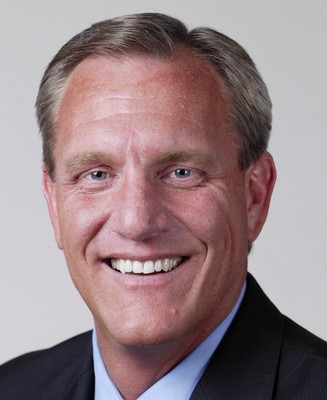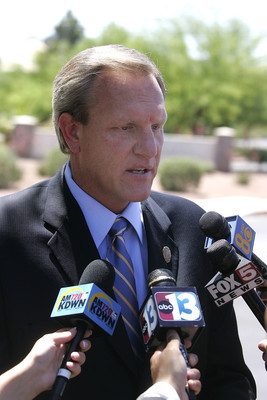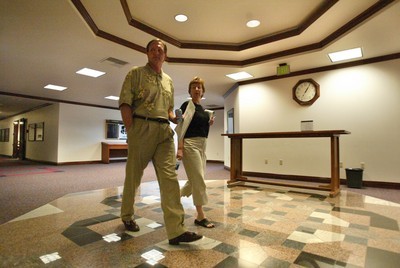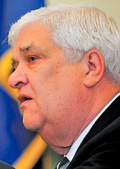Public service pays off
Former Henderson Police Chief Richard Perkins was on the city payroll two months this fiscal year, but he stands to pull down nearly $450,000 from City Hall at a time when politicians must slash services or raise taxes as government revenue plummets with the state economy.
Perkins, 47, stepped down this past summer with the minimum 25 years of service credit on the police force, necessary to qualify for a full pension.
His years, combined with the $168,478 salary he received when he departed, gave him a pension worth an estimated $99,400 a year.
With guaranteed increases linked to the consumer price index, he will draw more than $3 million over the 30 years a man his age can expect to live.
As a result, in retirement, Perkins stands to collect at least 57 percent more than the $1.9 million total he collected in base salary during his entire career in Henderson.
He also received a one-time separation check worth $242,132, which included $191,456 of accrued sick leave and $44,165 of accrued vacation leave, according to Henderson officials.
Perkins, a Democrat, also represented Henderson in the Assembly for 14 years, six as the powerful Assembly speaker.
Last month, he received another $120,000 to lobby on the city's behalf his former colleagues in the Legislature during the six-month session that starts Monday in Carson City.
Next year, Perkins stands to collect still another $120,000 to lobby lawmakers who aren't scheduled to be in session again until 2011.
In addition, as a former state legislator, Perkins is scheduled to collect a second pension from the state worth approximately $4,200 a year after he turns 60, according to legislative records.
Perkins said his experience, his relationships and reputation for working across party lines qualify him to serve as a lobbyist, even though he never had a client before the city hired him through a two-year, no-bid contract.
He pointed out that he, like other state and local government workers, contributed 16.5 percent of his salary to his police pension over the years, and that he purchased five months of service credit to meet the 25-year threshold required for a full pension.
Perkins added that his retirement benefit is not unreasonable considering he was the chief executive of a police department with a $73 million budget and 700 employees. Also, Perkins' pension doesn't compare with the golden parachutes received by corporate executives, he said.
"If you look at the private sector, I don't think anybody is going to complain about a $99,000 a year retirement," Perkins said.
At a time when University Medical Center has closed its cancer ward, the Clark County School District is considering closing schools and the University of Nevada, Las Vegas, budget may be chopped in half to save tax revenue, Perkins' payoff illustrates the disparity between the benefits offered government workers and those of the taxpayers who fund their salaries and benefits.
A private-sector employee would need to sock $1.7 million or more into a 401(k) to earn an income comparable to Perkins after retirement, said Dwight Machael, president of the American Retirement Planning Group in Las Vegas. If a private sector employee wanted to retire on half as much, they would need about $1 million in a 401(k) plan, Machael added.
"It shows the inequality between the public employees' retirement and the guy who starts his own business and tries to save for retirement," Machael said. "It's quite inequitable. The public employee retires with two to three times more than the private-sector guy is going to accumulate, especially with the market the way it is."
Records of the state's Public Employees' Retirement System are confidential and hidden from the public and press, even though a public employee's salary, benefits and the number of years served are public records. As a result, the Review-Journal calculated Perkins' annual pension, and the former police chief confirmed the newspaper's estimate is "in the ballpark."
Perkins' windfall comes 24 years after the Legislature last took steps to reduce retirement benefits for government employees, and 22 years after the federal government dropped for new employees its traditional pension program for one more like private-sector retirement plans known as the Federal Employee Retirement System.
As the 2009 Legislature convenes Monday for what most expect will be a budget battle between Republicans and Democrats, Gov. Jim Gibbons' Spending and Government Efficiency Commission has unanimously recommended reductions in the Public Employees' Retirement System for newly hired employees that it claims could save tens-of-millions of dollars and align the retirement benefit more closely with the private sector.
PENSION REFORM: NOW, LATER, NEVER?
Assembly Speaker Barbara Buckley, D-Las Vegas, referred questions on this topic to Assistant Majority Leader Marcus Conklin, D-Las Vegas. He said the Legislature should consider PERS reform recommendations from the SAGE Commission, a bipartisan group of Nevada business people. But Conklin said that unlike the SAGE Commission, lawmakers must consider the consequences of reducing PERS, such as the government's ability to attract qualified personnel.
"We are not going to take the approach of cutting for the sake of cutting," Conklin said. "At this point, we have an obligation to look at everything, and we have to consider whether our money is well spent on PERS."
The largest group of PERS benefactors are Clark County School District employees, followed by state workers and Clark County employees.
County Commission Chairman Rory Reid, who is considered a possible Democratic gubernatorial candidate in 2010, also said the Legislature should at least consider the SAGE proposals.
"They need to look at it now, because we are in a time in Nevada's economy like no other, and we have to ask these questions," Reid said.
According to PERS, the last time the state reduced retirement benefits was 24 years ago, about the time Perkins started as a patrol officer with the Henderson Police Department. But labor unions challenged the reductions in court, and prevailed.
Had the SAGE recommendations been in place when Perkins started with the department, his pension would be about 25 percent less per year, according to Review-Journal calculations.
SAGE Commission Chairman Bruce James, a Republican, said a survey of public and private employers found wages comparable, but the value of pensions and other public-sector benefits are "substantially more than 50 percent greater."
"If the salaries are about right and the benefits are substantially higher, this needs to be brought in line. ... This should have been done years ago," James said.
"People are at the point that they want to make things equitable and fair, and, hopefully, the Legislature will do so."
SAGE Commission member David Goldwater, a former Democratic Assemblyman from Las Vegas, said the recommendations for the retirement system are intended to balance the demands of employees and the taxpayers.
The commission was unanimous on the PERS proposal, but only after compromises were made, Goldwater said. For instance, police officers and firefighters are exempt from some of the changes proposed.
"Me and (fellow Democratic commission member) Mayor Jan Jones believe that state workers have value and should be treated with value, but something needs to be done to keep the retirement system solvent," Goldwater said.
James said the commission ruled out any proposal that would have overhauled PERS' current defined-benefit program with a defined-contribution program similar to a 401(k) program. With the stock market collapse, such a proposal would "have been dead on arrival" in the Democratic-controlled Legislature, James said.
Perkins said he met recently with public employee labor unions, and they recognize times are tough for state and local government.
Many of the SAGE recommendations on PERS "are worthy of debate. As everybody says, everything is on the table ... but we also have to recruit and retain good employees," Perkins said. "I think we will see public employees participating in a responsible look at the retirement system" this legislative session.
RAISING THE AGE, LOWERING THE BENEFITS
The commission, which James said includes seven Republicans and seven Democrats, made three unanimous recommendations: That the retirement age for most government workers be raised to 60, and 35 years of service be required to qualify for early retirement with a lower pension; that pensions be calculated from base pay only; and that the calculation formula itself be changed.
As it stands now, police and firefighters can retire with a full pension at any age after 25 years of work, and other government workers can retire after 30 years.
The average retirement age for a government worker in Nevada is 60 years with 18.5 years of service.
For police and firefighters, the average retirement age is 55 after 22 years on the job, according to PERS.
The commission recommends that the proposed change in policy not apply immediately to police officers and firefighters, but that their benefits be studied separately.
"We ought to revisit the police and fire issues and increase that period of service by some increment," James said.
Calculating pension from base pay only would dramatically depart from present practice, in which salary, longevity pay, holiday pay, stipends for special duty, and many other pay types are included in the arithmetic.
As a police officer in the 1980s and 1990s, Perkins was eligible for various such payments. As deputy chief and chief of police, though, Perkins was paid an executive salary, received the city's executive-level benefits package and was not eligible for other pay types.
Retired police officers and firefighters from Nevada in 2007 received an average of $3,549 a month from PERS, or 60 percent more than the average $2,216 received by other government employees.
The higher pension is solely a reflection of the higher total compensation paid police and firefighters, said Dana Bilyeu, executive officer for Nevada PERS.
The average monthly pension for police and firefighters climbed 59 percent from 1998 to 2007, and the average pension for other government workers grew 51 percent in that time, according to PERS.
PERS calculates pensions by multiplying the number of years worked by either 2.5 or 2.67 (the higher figure for work after June 30, 2001). Then, PERS applies that number as a percentage of average compensation over an employee's highest-paid three years.
The formula means Perkins collects in pension about 64 percent of that average wage.
The SAGE Commission recommends that PERS average the employee's highest-paid five years, and multiply the years worked by 2.1, a multiplier about 20 percent smaller than the current 2.67.
Had the five-year average applied in Perkins' case, his pension would have been $92,969 or 6.5 percent lower, based on Review-Journal calculations.
In addition, had the recommended lower factor applied to Perkins, he would have received an estimated $74,082 in annual pension, which is 25 percent lower than the pension he is believed to receive.
The state Legislature raised the PERS multiplier from 2.5 to 2.67 in 2001 while Perkins was Assembly speaker. He and other government workers with him in the Assembly were among the 23 Assembly members who authored a bill that year to increase PERS benefits.
The original version of the bill contained an even higher multiplier for police and firefighters: 2.75 percent. But the perk for public-safety workers failed after the PERS Board opposed the move, saying it would either force PERS to increase rates on government agencies or compel the board to carry unfunded liabilities on its books.
Perkins said the state had a robust economy in the months before the Sept. 11, 2001, terrorist attacks in New York and Washington, D.C., and that the increase in PERS benefits seemed prudent.
Contact reporter Frank Geary at fgeary @reviewjournal.com or 702-383-0277.
PERKINS TIMELINE
1984: Henderson Police Department hires Richard Perkins as one of a few dozen officers on its then-small force.
1992: Voters from Henderson Assembly district elect Perkins, a Democrat, to the Nevada Legislature’s lower house.
December 2000: Henderson promotes Perkins to deputy police chief.
January 2001: Assembly promotes Perkins to speaker, its most powerful post.
August 2005: After a $14,000 national search for a new police chief, Henderson hires Alan B. Kerstein, then chief of police for the Los Angeles School District.
September 2005: Expected to announce a run for governor, Perkins instead announces he won’t run for governor or for re-election to the Assembly. Henderson Mayor Jim Gibson runs for the Democratic nomination but loses to Dina Titus, who in turn loses the general election to Republican Jim Gibbons.
March 2006: Police chief Kerstein, 58, resigns after reports that he had city employees pick him up at the airport after private travel, and installed luxury equipment in his city vehicle at taxpayer expense. City officials deny Kerstein was forced out to make room for Perkins. Later that month, Perkins is named interim police chief.
July 2006: Henderson makes Perkins permanent chief.
December 2006: Perkins leaves Assembly.
September 2008: Perkins, 47, retires from police department.
December 2008: Henderson approves two-year, $240,000 consulting contract with Richard Perkins Co. to lobby Nevada Legislature.
Las Vegas Review-Journal





















